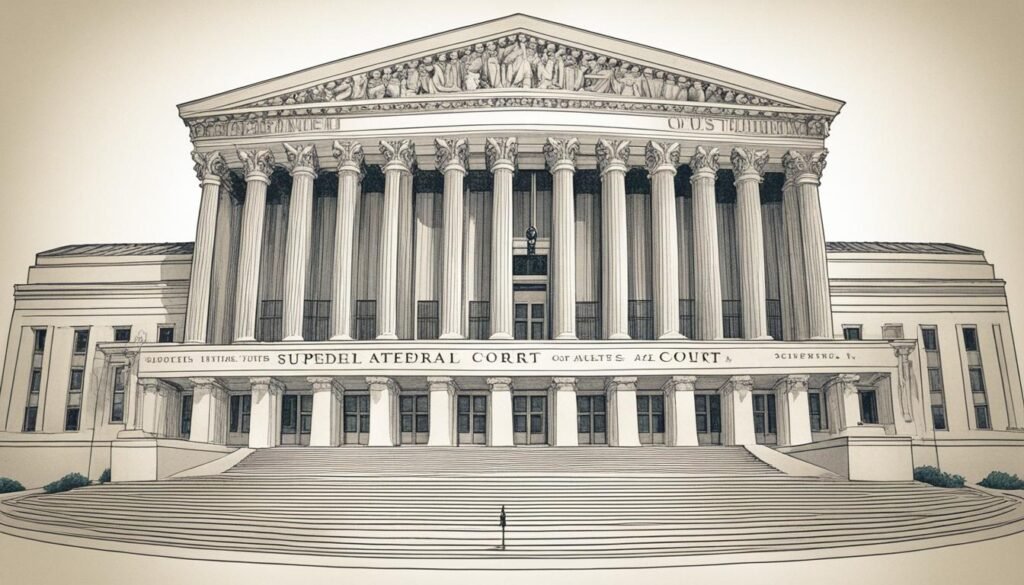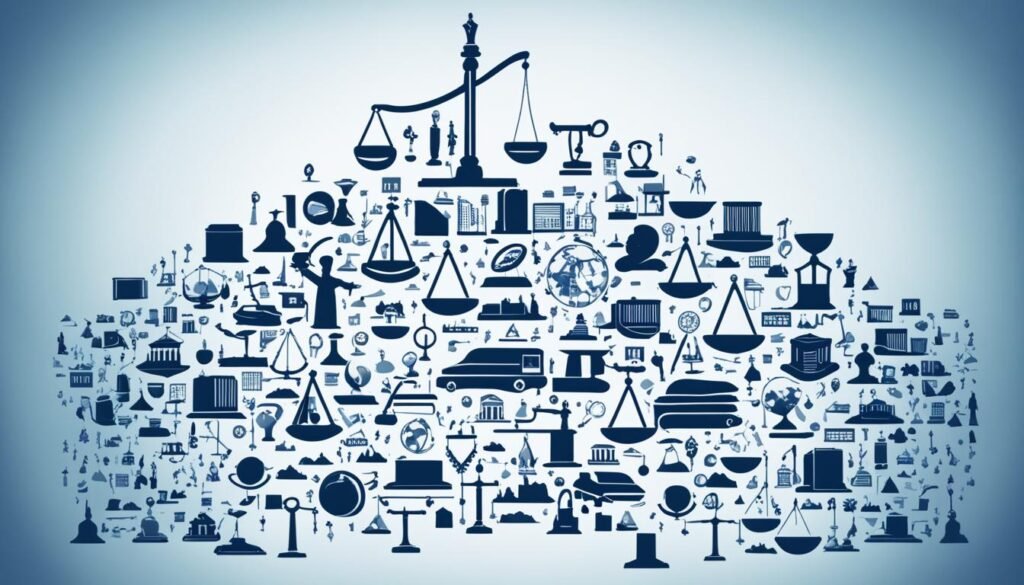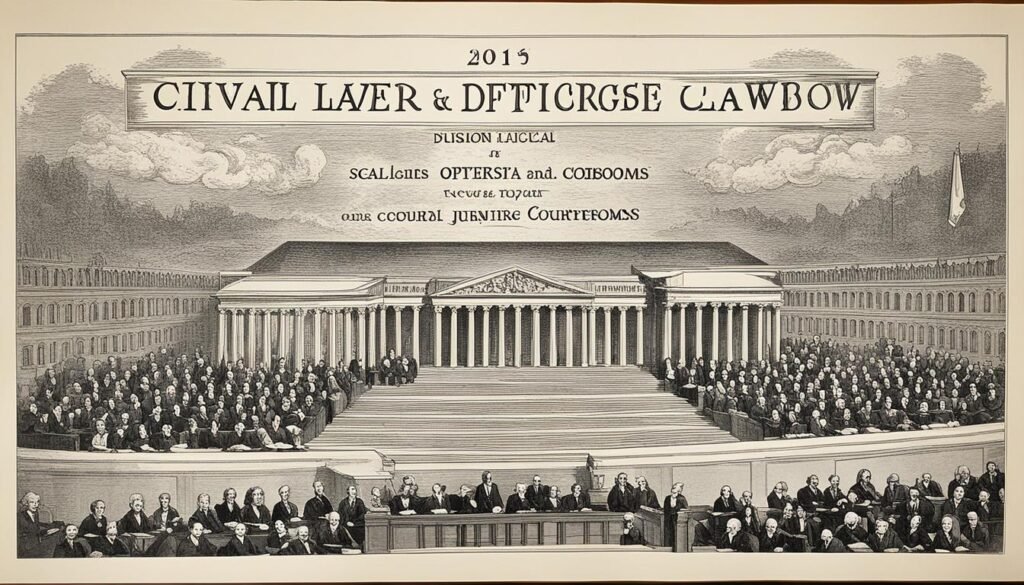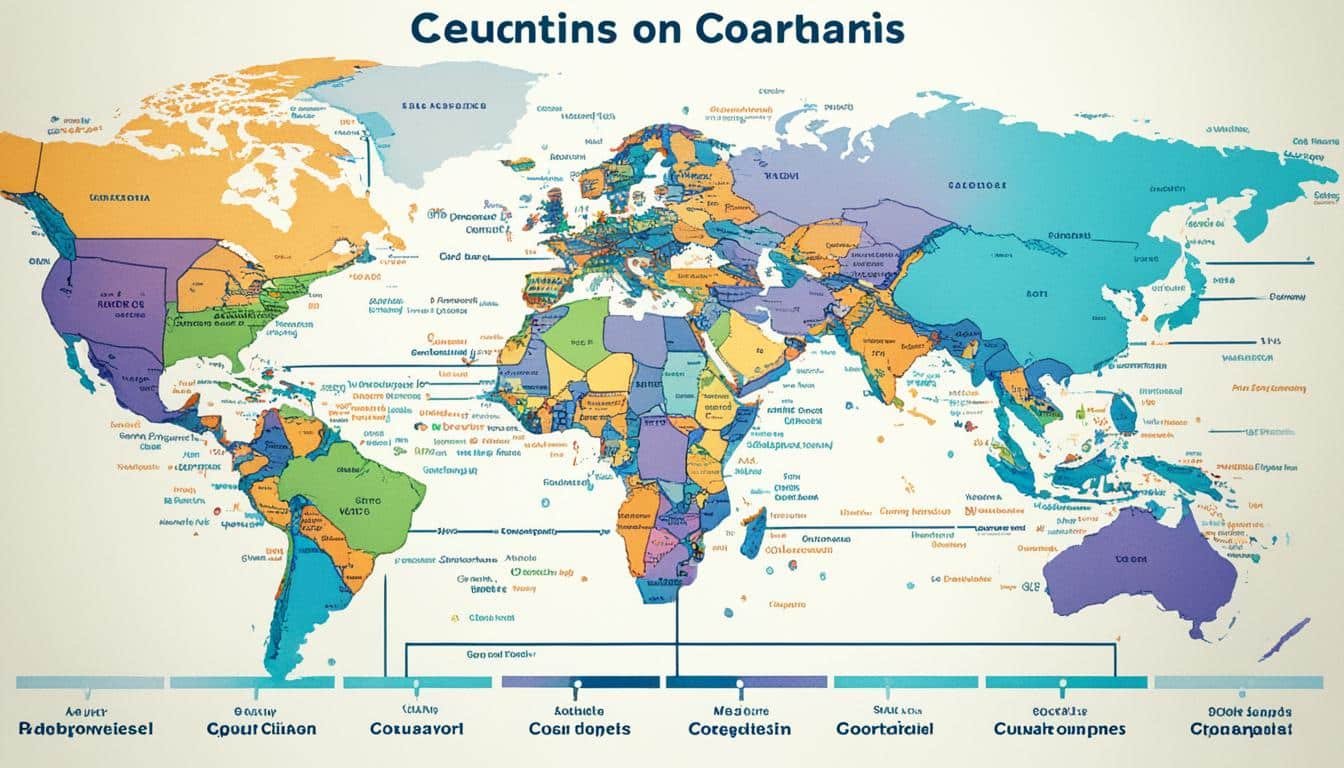Jurisdiction is key in the legal world. It sets the limits on who or what a court or governing body can control. Knowing about different kinds of jurisdiction helps people work within the legal system. This ensures everyone gets fair treatment and justice is done efficiently.
Also Read: The Foundation Of Democracy: Understanding The Constitution
In the U.S., there are federal and state courts, each with its own powers. The federal court system was created by Article III of the U.S. Constitution. It includes the Supreme Court, U.S. Courts of Appeals, and U.S. District Courts. It also has special courts like the U.S. Court of Claims and the U.S. Court of International Trade. State court systems work within one state’s borders and have their own rules and powers.
Sometimes, courts at different levels disagree on their power, or who should hear a case. This leads to jurisdictional disputes. They use due process, general jurisdiction, appellate jurisdiction, and other legal principles to solve these issues.
Outside the U.S., legal systems have different jurisdiction setups. This includes civil law, common law, customary law, and religious law. Understanding these systems is crucial for global legal matters and solving conflicts in laws.
Key Takeaways
- Jurisdiction is the legal authority of a court or governing body to exercise power over particular persons, territories, or subject matters.
- The U.S. legal system is divided between federal and state courts, each with their own distinct jurisdictional boundaries and structures.
- Jurisdictional disputes can arise when the boundaries of authority between federal and state courts are unclear or when multiple courts claim the right to hear a particular case.
- Legal systems around the world exhibit a diverse range of jurisdictional frameworks, including civil law, common law, customary law, and religious law systems.
- Understanding the unique characteristics and underlying principles of these various legal traditions is crucial for navigating the complexities of international jurisdiction and conflict of laws.
Also Read: The Process Of Legislation: From Proposal To Law
Understanding the Concept of Jurisdiction
Jurisdiction means the power of a court or governing body to make legal decisions over certain people, places, or matters. It sets the boundaries for legal authority. This is key for making sure justice is served correctly.
Definition of Jurisdiction
Merriam-Webster says jurisdiction is “the official power to make legal decisions.” In the legal world, jurisdiction is about a court’s or body’s power over specific areas or issues.
Importance of Jurisdiction in the Legal System
Jurisdiction is a vital legal concept. It shows which courts have the right to hear and decide cases. This helps avoid confusion and keeps the legal system fair. It also supports important legal principles like due process and the rule of law.
The jurisdiction of a court or body is based on the constitution and other laws. These rules define what territories and issues they can oversee. Sticking to these rules is crucial for the system to work properly.
Also Read: The Evolution Of The Legal Profession: A History Of Lawyer
Federal and State Court Systems

The U.S. has a federal and state court system. Each has its unique structure and rules. They also have different judges’ selection methods.
Structure of the Federal Court System
The federal system comes from Article III of the U.S. Constitution. It includes the Supreme Court and other lower courts. The Supreme Court is the top court in the whole federal system.
Structure of the State Court System
States create their own court systems through their laws and constitutions. Each state’s court system is a bit different. They have trial courts, appeals courts, and a supreme court.
Selection of Judges
Federal judges are picked by the President and approved by the Senate. State judges, on the other hand, are usually elected by the people. How judges are chosen can vary from state to state.
Also Read: Roles And Responsibilities Of An Attorney In Modern Legal Systems
| Federal Court System | State Court System |
|---|---|
| Established by Article III of the U.S. Constitution | Established by the constitutions and laws of each individual state |
| Includes the Supreme Court, U.S. Courts of Appeals, U.S. District Courts, and specialized courts | Typically includes a hierarchy of courts, such as trial courts, intermediate appellate courts, and a state supreme court |
| Federal judges are appointed by the President and confirmed by the U.S. Senate | State judges are generally elected or appointed through a variety of methods, such as merit-based selection, partisan elections, or non-partisan elections |
| The Supreme Court has ultimate jurisdiction over all other federal courts | The specific structure and jurisdiction of state courts can vary significantly across different states |
Types of Cases Handled by Different Courts

The U.S. has both federal and state courts. Each handles different cases. It’s important to know the difference. This helps anyone using the legal system understand where to go.
Federal Court Jurisdiction
The U.S. Constitution and laws decide what cases federal courts can hear. They cover cases like those involving the Constitution or federal laws.
They also handle disputes between states, cases with foreign diplomats, bankruptcy, and others. U.S. District Courts lead in handling most federal cases.
Another key area for federal courts is diversity jurisdiction. This lets them hear certain civil cases. These might be between people from different states or countries. The case value must be over $75,000.
Also Read: Inside The Courtroom: An In-depth Look At Judicial Proceedings
Federal courts also have exclusive jurisdiction in some cases. This means only they can handle cases like those about federal antitrust laws. Or cases involving patents.
State Court Jurisdiction
State courts’ power comes from their state’s laws and constitution. They can handle a wide range of cases. This includes civil and criminal cases that involve state laws and the state’s constitution.
State courts can also review cases from lower state courts. They handle many types of cases, including those about contracts, family issues, probate, and most criminal matters. They also deal with cases that involve state-level agencies and rules.
Federal and state court powers can sometimes overlap. This creates what we call concurrent jurisdiction. This means a case can go to either a federal or state court. The one suing gets to choose in these situations.
Jurisdiction

Jurisdiction is key in the legal system. It’s about the authority a court or body has. They can make decisions over certain people, places, or topics. This power is very important. It shows what a court or body can or can’t do about a case.
Many types of jurisdiction exist, like personal jurisdiction. This kind lets a court control over people or groups. There’s also subject matter jurisdiction. It decides what kind of cases a court can listen to. And territorial jurisdiction, which says where a court’s power ends. These rules are set by the U.S. Constitution, laws, and tradition.
Arguments over jurisdiction pop up in many situations. This could be in civil or criminal cases. Or when dealing with administrative law. When courts hear cases, they must think about minimum contacts. They also consider fair play and substantial justice. They use these to see if they should even listen to a case. If they^ don1t, the case won’t move further.
The Supreme Court changes how we think about jurisdiction. It does this by looking at the Constitution and federal laws. Its decisions set the rules for what courts can do. This keeps the courts and laws up to date with our changing world.
To get through the legal system, you need to know about jurisdiction. This determines the rules, what courts can decide, and how they should go about it. Learning this grounding idea helps you to get how the justice system works. It’s an important part of understanding justice in the United States.
Civil Law and Common Law Systems

The world’s legal systems are many and varied. They include the civil law and common law systems. It’s important to know about these systems to understand how laws and court decisions work.
Characteristics of Civil Law Systems
In places like Europe, Latin America, and parts of Asia and Africa, the civil law system is used. It follows the Roman legal tradition. This system uses detailed legal codes for all laws. It clearly separates public and private laws. Unlike the common law system, it doesn’t strictly focus on using past court decisions to guide new ones. The main legal decisions are usually published publicly, not as case law.
Characteristics of Common Law Systems
The common law system is different. It’s followed in countries like the United States, the United Kingdom, Canada, and Australia. This system is designed around using previous court decisions to guide new ones. This makes the law system more adaptable because judges can look at past cases to decide new ones.
Stare Decisis and Precedent
Stare decisis, or the doctrine of precedent, is critical in common law systems. It means that lower courts have to follow the decisions of higher courts on the same issues. This keeps the legal system predictable and consistent. Civil law systems, however, don’t rely as much on previous decisions. Instead, they focus on applying written laws directly.
Customary and Religious Law Systems

Some places in the world follow legal systems apart from civil and common law. These systems are customary law and religious law. They work alongside the formal laws made by governments.
Customary Law
Customary law comes from the traditions of a community or region. It’s often not written down. This type of law influences personal behavior, property, and family matters. Learning about customary law can be hard because it’s not always well-documented.
In some parts of the world like Africa, Asia, and the Pacific, customary law is very important. It has been around for centuries, shaped by the area’s cultural beliefs. While it helps people feel connected to their heritage, it sometimes clashes with the official laws of the country. This can lead to disagreements over which laws should apply.
Religious Law
Religious law follows the rules set by a faith. The top examples include Islamic law (Sharia), Jewish law (Halakha), and Canon law (Catholic Church). These laws guide marriage, inheritance, and personal lifestyle.
How religious law is used can change among different groups within a religion. Some countries make their legal system blend with religious laws. Others keep them separate. In places where they mix, this can cause confusion for people dealing with the legal system.
Mixed Legal Systems

Mixed legal systems combine different legal traditions. They include civil law, common law, customary law, and religious law. These systems are in many places in the world. Various legal systems have learned from each other over time. The Legal Information Institute offers great insights into these complex systems.
In mixed legal systems, state and federal laws interact, making things complex. The court’s jurisdiction can cover many different states. The rules within these systems depend on a careful balance. This balance includes judicial scope, federal jurisdiction, and statutory limits.
The territorial boundaries and judicial power of a court can change in a mixed legal system. This change depends on the governing body and laws. Also, it is influenced by the legislative power and adjudicative purview. It’s important to understand these to work within the legal system well.
These systems’ sovereign reach and regulatory jurisdiction affect their power. They have an impact on how laws are made and enforced. This includes court oversight, legislative scope, and regulatory purview. It’s vital to know the jurisdictional limits in these systems.
Also Read: What Is Military Law And Its Purpose?
Determining Jurisdiction for a Case
Finding the right jurisdiction for a case is key. There are three main kinds: personal, subject matter, and territorial. Knowing about each helps make sure a case is in the right court.
Personal Jurisdiction
Personal jurisdiction is about the court’s power over case parties. It must have this over the defendant to rule on a case. A key way to do this is through the “minimum contacts” rule. This means the defendant must have enough ties to the place for the court to act on the case.
Subject Matter Jurisdiction
Subject matter jurisdiction is about the court’s power to decide on certain case types. For example, federal courts handle cases with federal law issues. State courts manage cases that deal with state laws or local rules.
Territorial Jurisdiction
Territorial jurisdiction outlines a court’s physical and legal reach. It includes where the court is and any special areas it can cover. Knowing this helps pick the right place to hear a case.
FAQs
Q: What is Jurisdiction?
A: Jurisdiction refers to the power or authority of a court to hear and decide on a case.
Q: Can you explain the concept of Comparative Jurisdiction?
A: Comparative Jurisdiction involves comparing how different legal systems operate in terms of court authority and power.
Q: What does the term “synonym” mean in the context of jurisdiction?
A: In the realm of jurisdiction, “synonym” may refer to a court that has the same or similar authority as another court.
Q: How does Merriam-Webster define jurisdiction?
A: According to Merriam-Webster, jurisdiction is defined as the power, right, or authority to interpret and apply the law.
Q: What are some examples of courts with supreme jurisdiction?
A: Courts with supreme jurisdiction include the Supreme Court of the United States and the Supreme Court of India.
Q: What is the role of district courts in terms of jurisdiction?
A: District courts typically have original jurisdiction over most federal cases in the United States.
Q: When does a court have jurisdiction over a particular controversy?
A: A court has jurisdiction over a controversy when it has the legal authority to hear and decide on the specific case.
Source Links
- https://guides.libraries.emory.edu/law/foreign-law-basics
- https://www.uscourts.gov/about-federal-courts/court-role-and-structure/comparing-federal-state-courts
- https://judiciallearningcenter.org/wp-content/uploads/2012/11/Lesson-Plan-Types-of-Cases.pdf





